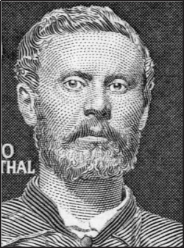- LILIENTHAL
- GERMANY (see also List of Individuals)\
 24.5.1848 Anklam/D - 10.8.1896 Berlin/D\Otto Lilienthal graduated in 1870 from the Berlin Gewerbeschule. After participation in the Franco-Prussian War, he was for eight years in a machinery factory to found his own works in 1880. There he successfully produced ropes for force transmission and horns for vessels.\Lilienthal's interest in flight started when being a boy. Together with his brother Gustav, wings were tested by running down a hill. Once in Berlin, the wings were attached on the back and moved as by a bird with the legs. Failures were compensated by a detailed observation of the air resistance of birds. Using a primitive wind tunnel the brothers observed that vaulted wings had a better performance than plane wings usually adopted. The observations were published in the by now classic 1889 paper. Lilienthal was a man of practice: Instead of further theories, he wanted to experience flight, in particular gliding, because this demanded the minimum effort for the pilot and appeared to be the perfect way of locomotion. For him, the secret of gliding was the most distinguished task of aviation. The apparatus prepared for the 1891 campaign looked like birds' wings with a parabolic curvature. The original wing surface of 10 m2 was reduced to 8 m2, comprising a total width of 7 m and 2 m of length. The total weight of the wing construction was 18 kg. Takeoff was facilitated with a bucket at the end of a 10 m long runway. Maximum flying distances during calm were some 7 m with a remarkably soft landing, such that experiments were repeated all through a day. During wind, the flight was complicated and an additional rudder for stabilization was required. In 1892 experiments were made with a slightly larger apparatus from a hill in Steglitz, where flying distances of up to 80 m were performed. From 1893 fold up wings were used and a 10 m high takeoff was installed on a hut. An even better location for starts and winds was found in Rathenow where a heavier wing was tested with flying distances of up to 300 m. These experiments were concluded in 1894 in Gross-Lichterfelde close to Berlin. Lilienthal thus prepared man-powered flights by using a suitable rudder. On August 9th 1896, he had a good start which suddenly ended in a vertical drop, causing the pilot's death the following day. Today, Lilienthal is considered the father of gliding and wind tunnel experimentation.\Lilienthal, O. (1889). Der Vogelflug als Grundlage der Fliegekunst. Gärtner: Berlin. Michel Briefmarkenkatalog (1980). Otto Lilienthal. Berlin 92. Schwaneberger: München. PMüllenhoff, K. (1896). Zur Erinnerung an Otto Lilienthal. Zeitschrift für Luftschiffahrt und Physik der Atmosphäre 15(12): 289-295. P
24.5.1848 Anklam/D - 10.8.1896 Berlin/D\Otto Lilienthal graduated in 1870 from the Berlin Gewerbeschule. After participation in the Franco-Prussian War, he was for eight years in a machinery factory to found his own works in 1880. There he successfully produced ropes for force transmission and horns for vessels.\Lilienthal's interest in flight started when being a boy. Together with his brother Gustav, wings were tested by running down a hill. Once in Berlin, the wings were attached on the back and moved as by a bird with the legs. Failures were compensated by a detailed observation of the air resistance of birds. Using a primitive wind tunnel the brothers observed that vaulted wings had a better performance than plane wings usually adopted. The observations were published in the by now classic 1889 paper. Lilienthal was a man of practice: Instead of further theories, he wanted to experience flight, in particular gliding, because this demanded the minimum effort for the pilot and appeared to be the perfect way of locomotion. For him, the secret of gliding was the most distinguished task of aviation. The apparatus prepared for the 1891 campaign looked like birds' wings with a parabolic curvature. The original wing surface of 10 m2 was reduced to 8 m2, comprising a total width of 7 m and 2 m of length. The total weight of the wing construction was 18 kg. Takeoff was facilitated with a bucket at the end of a 10 m long runway. Maximum flying distances during calm were some 7 m with a remarkably soft landing, such that experiments were repeated all through a day. During wind, the flight was complicated and an additional rudder for stabilization was required. In 1892 experiments were made with a slightly larger apparatus from a hill in Steglitz, where flying distances of up to 80 m were performed. From 1893 fold up wings were used and a 10 m high takeoff was installed on a hut. An even better location for starts and winds was found in Rathenow where a heavier wing was tested with flying distances of up to 300 m. These experiments were concluded in 1894 in Gross-Lichterfelde close to Berlin. Lilienthal thus prepared man-powered flights by using a suitable rudder. On August 9th 1896, he had a good start which suddenly ended in a vertical drop, causing the pilot's death the following day. Today, Lilienthal is considered the father of gliding and wind tunnel experimentation.\Lilienthal, O. (1889). Der Vogelflug als Grundlage der Fliegekunst. Gärtner: Berlin. Michel Briefmarkenkatalog (1980). Otto Lilienthal. Berlin 92. Schwaneberger: München. PMüllenhoff, K. (1896). Zur Erinnerung an Otto Lilienthal. Zeitschrift für Luftschiffahrt und Physik der Atmosphäre 15(12): 289-295. P
Hydraulicians in Europe 1800-2000 . 2013.
